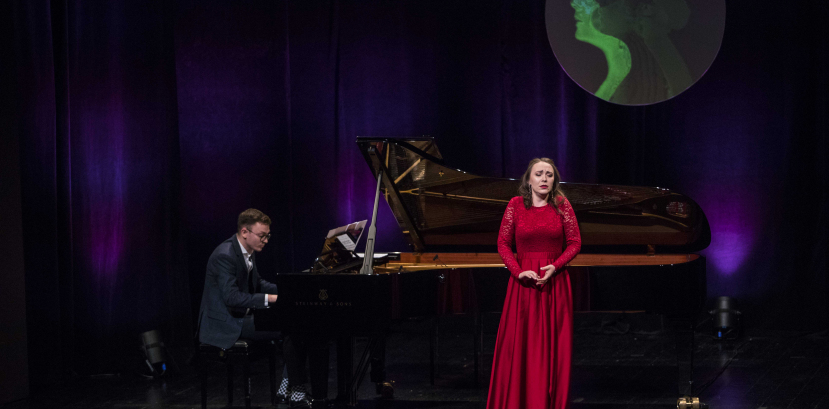Reviews written by Barbara Zamek of auditions of participants in the 3rd stage of the 19th Ada Sari International Vocal Artistry Competition
NALEWAJEK Zuzanna | mezzo-soprano
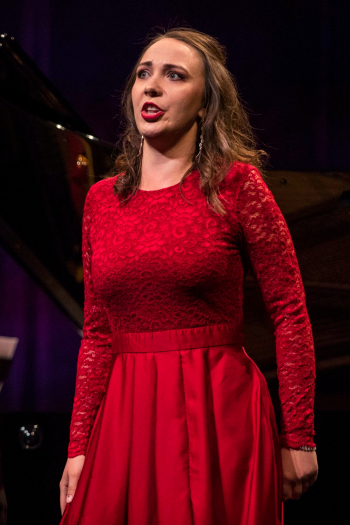 The final round of the Competition opened with the performance of mezzo-soprano Zuzanna Nalewajek. As the first piece, she sang W.A. Mozart’s recitative and an aria „Ah! Scostati / Smanie implacabili”. In the previous stages, the soloist showed that her strong point is interpretation. This time the performance seemed to be full of tension, and the over-emotionality did not help to control the competition nerves. The aria lacked a calmer melodic line, and the gestures were too expressive. It was similar in the second aria she presented: „Una voce poco fa” by G. Rossini, during which she did not even try to show off her high notes. On the other hand, she presented Rossini's coloratura skillfully and interpreted the lyrics in both pieces effectively.
The final round of the Competition opened with the performance of mezzo-soprano Zuzanna Nalewajek. As the first piece, she sang W.A. Mozart’s recitative and an aria „Ah! Scostati / Smanie implacabili”. In the previous stages, the soloist showed that her strong point is interpretation. This time the performance seemed to be full of tension, and the over-emotionality did not help to control the competition nerves. The aria lacked a calmer melodic line, and the gestures were too expressive. It was similar in the second aria she presented: „Una voce poco fa” by G. Rossini, during which she did not even try to show off her high notes. On the other hand, she presented Rossini's coloratura skillfully and interpreted the lyrics in both pieces effectively.
NAPIERAŁA Stanisław | tenor
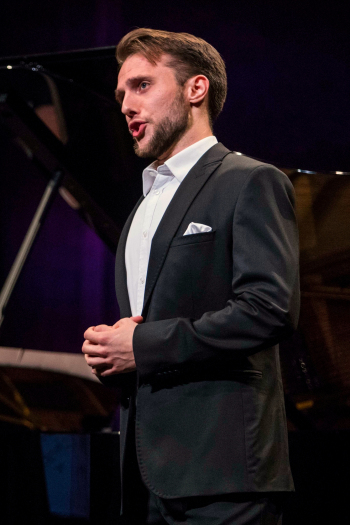 Earlier performances of tenor Stanisław Napierała were characterized by great control over his confident sounding voice. Perhaps the pressure of the final stage of the Competition and the selection of the repertoire made the soloist seem much more tense in the final. It was evident that he was not fully focused on interpretation and seemed to focus mostly on controlling his voice. In the first aria, G. Donizetti's „Una furtiva lagrima”, the singer’s voice sounded resonant, but there was not enough legato phrasing and well supported piano. He started a little calmer with G. Verdi's aria ”Lunge da lei / De ’miei bollenti spiriti”. It seemed that the 24-year-old singer did not yet have enough maturity in his voice to perform this repertoire.
Earlier performances of tenor Stanisław Napierała were characterized by great control over his confident sounding voice. Perhaps the pressure of the final stage of the Competition and the selection of the repertoire made the soloist seem much more tense in the final. It was evident that he was not fully focused on interpretation and seemed to focus mostly on controlling his voice. In the first aria, G. Donizetti's „Una furtiva lagrima”, the singer’s voice sounded resonant, but there was not enough legato phrasing and well supported piano. He started a little calmer with G. Verdi's aria ”Lunge da lei / De ’miei bollenti spiriti”. It seemed that the 24-year-old singer did not yet have enough maturity in his voice to perform this repertoire.
POLAŃSKA Maria | mezzo-soprano
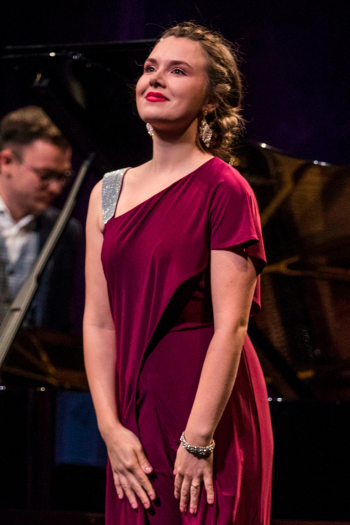 Mezzo-soprano Maria Polańska seemed very self-confident from the very beginning. The competition nerves could be seen in excessive gesticulation, but the facial expressions and posture were perfectly suited to the content of the works performed. In the first piece, G. Rossini recitative and aria „Cruda sorte”, she had problems with intonation. She handled the second piece „Ich lade gerne mir Gäste ein” by J. Strauss vocally better. The whole performance lacked secure top notes, and there was a thick vibrato in the voice.
Mezzo-soprano Maria Polańska seemed very self-confident from the very beginning. The competition nerves could be seen in excessive gesticulation, but the facial expressions and posture were perfectly suited to the content of the works performed. In the first piece, G. Rossini recitative and aria „Cruda sorte”, she had problems with intonation. She handled the second piece „Ich lade gerne mir Gäste ein” by J. Strauss vocally better. The whole performance lacked secure top notes, and there was a thick vibrato in the voice.
ROY David | baritone
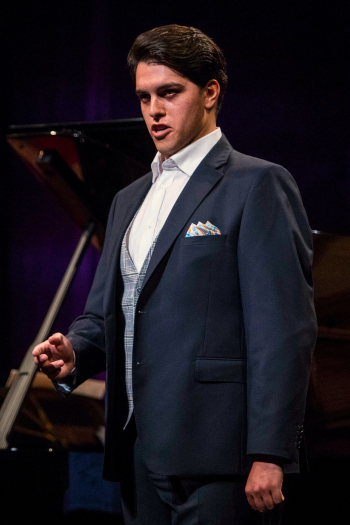 Baritone David Roy presented himself as confidently as in the previous stages. Softly and delicately, he began the first aria „Ja vas lyublyu” by P. Tchaikovsky. With a pouring, warm sounding voice, he assured his beloved Lisa of his feelings. Once again, the soloist showed great culture in singing, beautiful legato, and modesty in gestures and dynamics. His voice sounded subtle, perhaps too subtle for a repertoire that requires breaking through the dense texture of an orchestra. The balance between the voice and the piano in the small concert hall was sufficient. The second aria he presented was „Kto z mych dziewek” by S. Moniuszko. The singer perfectly interpreted the character of Miecznik, who firmly demands from his future son-in-law a militant and godly attitude as well as readiness to fight for his beloved homeland. The intentions in the soloist's voice and body language in both arias were very clear, but there was no clear diction.
Baritone David Roy presented himself as confidently as in the previous stages. Softly and delicately, he began the first aria „Ja vas lyublyu” by P. Tchaikovsky. With a pouring, warm sounding voice, he assured his beloved Lisa of his feelings. Once again, the soloist showed great culture in singing, beautiful legato, and modesty in gestures and dynamics. His voice sounded subtle, perhaps too subtle for a repertoire that requires breaking through the dense texture of an orchestra. The balance between the voice and the piano in the small concert hall was sufficient. The second aria he presented was „Kto z mych dziewek” by S. Moniuszko. The singer perfectly interpreted the character of Miecznik, who firmly demands from his future son-in-law a militant and godly attitude as well as readiness to fight for his beloved homeland. The intentions in the soloist's voice and body language in both arias were very clear, but there was no clear diction.
SKIBA Maksymilian | baritone
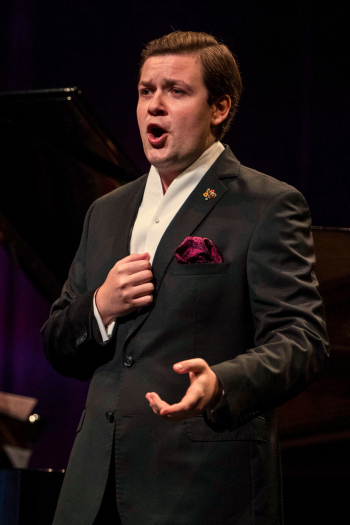 In the first stage, baritone Maksymilian Skiba sang W. A. Mozart’s aria „Donne mie, la fate a tanti very well”. In it, he showed everything that is good in his singing - voice concentration, musical sensitivity and a talent for interesting interpretations. Unfortunately, in the second and third stages, he chose arias in which his voice did not sound as good. He presented a lot of musicality and culture in singing, but failed to fill the full lyric phrases in R. Wagner’s „Wie Todesahnung / O! Du mein holder Abendstern”. In G. Donizetti’s aria „Cruda funesta smania / La pietade in suo favore”, there was not enough space in the voice and it lacked a strong upper register to make the character of Enrico sound more credible and decisive.
In the first stage, baritone Maksymilian Skiba sang W. A. Mozart’s aria „Donne mie, la fate a tanti very well”. In it, he showed everything that is good in his singing - voice concentration, musical sensitivity and a talent for interesting interpretations. Unfortunately, in the second and third stages, he chose arias in which his voice did not sound as good. He presented a lot of musicality and culture in singing, but failed to fill the full lyric phrases in R. Wagner’s „Wie Todesahnung / O! Du mein holder Abendstern”. In G. Donizetti’s aria „Cruda funesta smania / La pietade in suo favore”, there was not enough space in the voice and it lacked a strong upper register to make the character of Enrico sound more credible and decisive.
SKWARA Karol | bass
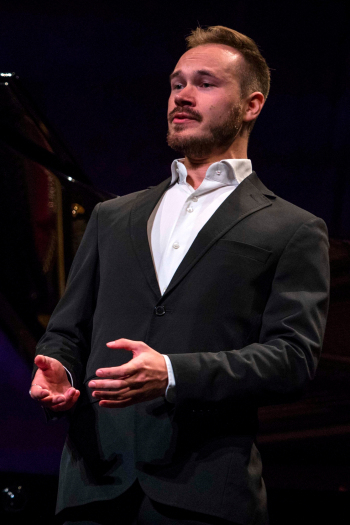 Bass Karol Skwara began his performance with G. Verdi’s recitative and aria „A te l'estremo addio / Il lacerato spirito”. He presented a thoughtful interpretation and good diction. Although he sang with great calm and his voice sounded confident in all registers, the chosen piece seemed too demanding for him. Next, the soloist performed G. Puccini’s aria „Vecchio zimarro”. This short piece lacked much differentiation and color, which made it sound quite monotonous.
Bass Karol Skwara began his performance with G. Verdi’s recitative and aria „A te l'estremo addio / Il lacerato spirito”. He presented a thoughtful interpretation and good diction. Although he sang with great calm and his voice sounded confident in all registers, the chosen piece seemed too demanding for him. Next, the soloist performed G. Puccini’s aria „Vecchio zimarro”. This short piece lacked much differentiation and color, which made it sound quite monotonous.
STEFAŃSKA Dominika | mezzo-soprano
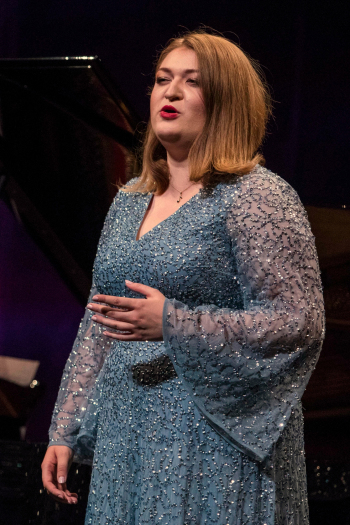 Mezzo-soprano Dominika Stefańska started her final performance with aria „Mon coeur s'ouvre à ta voix” by C. Saint-Saëns. Her voice sounded shrill and one could hear frequent intonation problems. The singer did not interpret freely and she did not manage to reliably portray Dalila's seductive charm. She presented herself better in S. Moniuszko’s aria „Jak będę królową”. She sounded more confident and free in interpreting the text, although all three verses had similar dynamics and there was no strong ending to the piece.
Mezzo-soprano Dominika Stefańska started her final performance with aria „Mon coeur s'ouvre à ta voix” by C. Saint-Saëns. Her voice sounded shrill and one could hear frequent intonation problems. The singer did not interpret freely and she did not manage to reliably portray Dalila's seductive charm. She presented herself better in S. Moniuszko’s aria „Jak będę królową”. She sounded more confident and free in interpreting the text, although all three verses had similar dynamics and there was no strong ending to the piece.
SZMIDT Jakub | bass
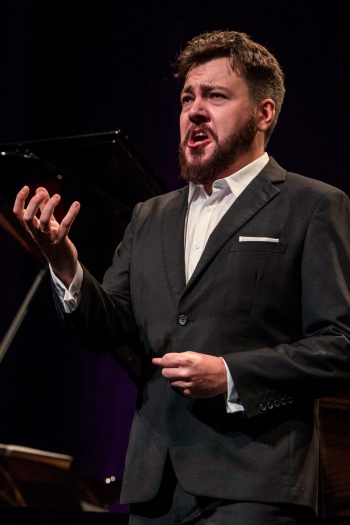 Bass Jakub Schmidt started his performance with the piece „Il lacerato spirito” by G. Verdi. In the previous stages, Jakub Schmidt's voice seemed less sonorous and not always uniform in all registers. It sounded much better in the final round of the Competition. The artist sang emotionally, interpreting with suggestive facial expressions as well as the intensity and color of his voice. His Fiesco was genuinely embittered, full of sorrow and fervor. On the other hand, Skołuba in S. Moniuszko’s aria „Ten zegar stary, gdyby świat” was presented by the artist in an elegant way, but he also did not lack a tasteful sense of humor. The soloist showed a beautifully sounding low register and only occasionally had problems with intonation.
Bass Jakub Schmidt started his performance with the piece „Il lacerato spirito” by G. Verdi. In the previous stages, Jakub Schmidt's voice seemed less sonorous and not always uniform in all registers. It sounded much better in the final round of the Competition. The artist sang emotionally, interpreting with suggestive facial expressions as well as the intensity and color of his voice. His Fiesco was genuinely embittered, full of sorrow and fervor. On the other hand, Skołuba in S. Moniuszko’s aria „Ten zegar stary, gdyby świat” was presented by the artist in an elegant way, but he also did not lack a tasteful sense of humor. The soloist showed a beautifully sounding low register and only occasionally had problems with intonation.
WIŚNIEWSKA Andżelika | mezzo-soprano
 Mezzo-soprano Andżelika Wiśniewska started with a graceful performance of P. Tchaikovsky’s aria „Ah Tanya, Tanya / Ja nye sposobna k grusti tomnoy”. The soloist interpreted the text in an exceptionally natural way. It was possible to believe that Olga, a young girl full of contagious optimism, was standing on the stage. In the second piece „Mon coeur s'ouvre à ta voix” by C. Saint-Saëns, the singer used all means at her disposal to build the character of the seductive Dalila. Body language, facial expressions, various colors of timbre, but also skilful manipulation of pace changes made her sound convincing. At times, there was a lack of precision in the intonation and also one wished for a fuller volume of the voice to better saturate the long lyrical phrases.
Mezzo-soprano Andżelika Wiśniewska started with a graceful performance of P. Tchaikovsky’s aria „Ah Tanya, Tanya / Ja nye sposobna k grusti tomnoy”. The soloist interpreted the text in an exceptionally natural way. It was possible to believe that Olga, a young girl full of contagious optimism, was standing on the stage. In the second piece „Mon coeur s'ouvre à ta voix” by C. Saint-Saëns, the singer used all means at her disposal to build the character of the seductive Dalila. Body language, facial expressions, various colors of timbre, but also skilful manipulation of pace changes made her sound convincing. At times, there was a lack of precision in the intonation and also one wished for a fuller volume of the voice to better saturate the long lyrical phrases.
ZIÓŁKOWSKA Sylwia | soprao
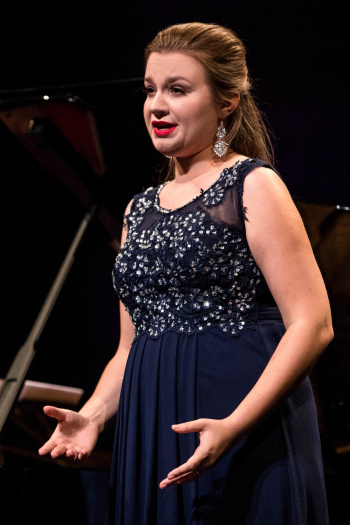 Soprano Sylwia Ziółkowska presented herself in the well suited to her voice aria „Quando m'en vo” by G. Puccini. She sang with great freedom and confidence, ending the performance with a beautiful high-pitched note. She sang her second piece, W.A. Mozart’s recitative and aria „Crudele! Ah no, mio bene! / Non mi dir, bell'idol mio”, in style, clearly articulating each word. She also presented herself very well in coloratures. There was a noticeable dense vibrato in her voice, which at times made her sound not precise when it comes to intonation.
Soprano Sylwia Ziółkowska presented herself in the well suited to her voice aria „Quando m'en vo” by G. Puccini. She sang with great freedom and confidence, ending the performance with a beautiful high-pitched note. She sang her second piece, W.A. Mozart’s recitative and aria „Crudele! Ah no, mio bene! / Non mi dir, bell'idol mio”, in style, clearly articulating each word. She also presented herself very well in coloratures. There was a noticeable dense vibrato in her voice, which at times made her sound not precise when it comes to intonation.
BLUJ Justyna | soprano
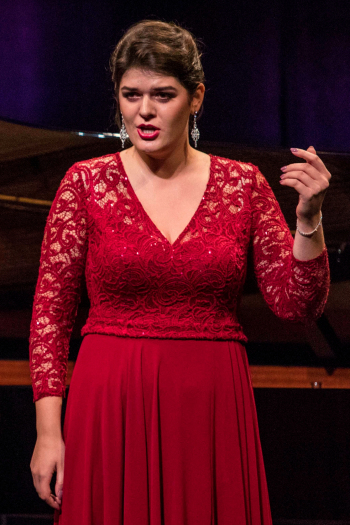 Soprano Justyna Bluj performed the pieces „Quando m'en vo” by G. Puccini and „Dich teure Halle” by R. Wagner. This is a surprising combination as these arias are usually performed by different types of soprano voices. Already in the previous stages, the singer showed great culture in singing and calmness on stage pleasant for the audience. In the finale, her voice sounded resonant and confident, however, the high notes were only touched and didn't sound safe.
Soprano Justyna Bluj performed the pieces „Quando m'en vo” by G. Puccini and „Dich teure Halle” by R. Wagner. This is a surprising combination as these arias are usually performed by different types of soprano voices. Already in the previous stages, the singer showed great culture in singing and calmness on stage pleasant for the audience. In the finale, her voice sounded resonant and confident, however, the high notes were only touched and didn't sound safe.
CHUNTISHVILI Ketevan | soprano
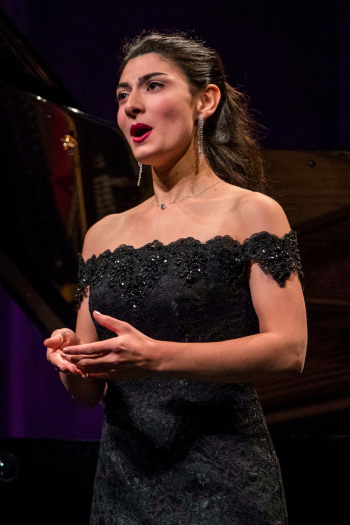 Georgian soprano Ketevan Chuntishvili captivatingly interpreted the figure of Gilda in love, frightened by the strength of her own feelings in the aria „Gualtier maldè / Caro nome” by G. Verdi. She led the melodic line beautifully, confidently singing all the high notes. The soloist emphasized each word with body language and facial expressions. She presented G. Donizetti’s recitative and aria „Quella fonte / Regnava nel silenzio” with equal expression. Her voice sounded warm in the lower register and luminous in the top, and all the phrases were finished with great care. At the very end of Lucia's recitative and aria, one could feel a slight tiredness in the singer's voice.
Georgian soprano Ketevan Chuntishvili captivatingly interpreted the figure of Gilda in love, frightened by the strength of her own feelings in the aria „Gualtier maldè / Caro nome” by G. Verdi. She led the melodic line beautifully, confidently singing all the high notes. The soloist emphasized each word with body language and facial expressions. She presented G. Donizetti’s recitative and aria „Quella fonte / Regnava nel silenzio” with equal expression. Her voice sounded warm in the lower register and luminous in the top, and all the phrases were finished with great care. At the very end of Lucia's recitative and aria, one could feel a slight tiredness in the singer's voice.
DYADIV Olga | soprano
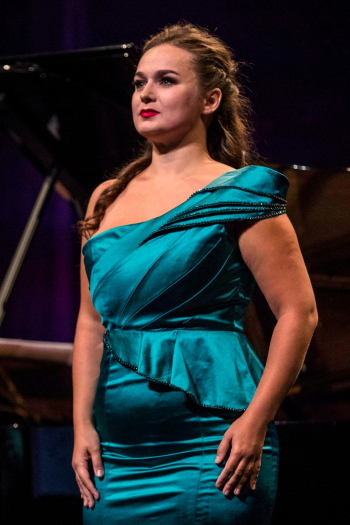 Ukrainian soprano Olga Dyadiv performed repertoire perfectly matched to her voice capabilities. She started with V. Bellini’s aria and cabaletta „Ah non credea mirarti / Ah non giunge”. In the first part of the piece, she showed off a beautiful piano in a high register and the ability to lead phrases musically. Equally well, she presented the cabalette that was different in character. She attacked the top notes with confidence and sang the fast passes with great liberty. At the end of the final concert, the singer presented J. Offenbach's aria „Les oiseaux dans la charmille”. She played a wind-up doll in a humorous way, singing excellently the vocally demanding composition.
Ukrainian soprano Olga Dyadiv performed repertoire perfectly matched to her voice capabilities. She started with V. Bellini’s aria and cabaletta „Ah non credea mirarti / Ah non giunge”. In the first part of the piece, she showed off a beautiful piano in a high register and the ability to lead phrases musically. Equally well, she presented the cabalette that was different in character. She attacked the top notes with confidence and sang the fast passes with great liberty. At the end of the final concert, the singer presented J. Offenbach's aria „Les oiseaux dans la charmille”. She played a wind-up doll in a humorous way, singing excellently the vocally demanding composition.

